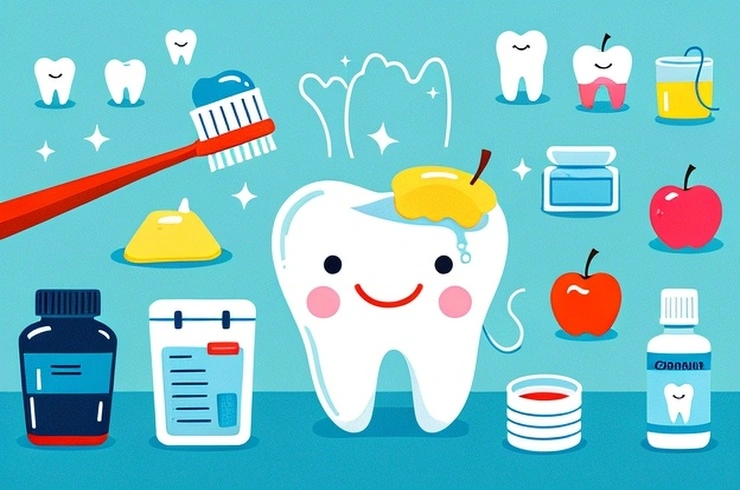
Maintaining optimal oral health is fundamental to overall well-being. A proactive approach to dental care can safeguard your teeth and gums for a lifetime, minimizing the likelihood of common issues like cavities and periodontitis. This guide outlines the essential pillars of a robust oral hygiene regimen: brushing, flossing, rinsing, mindful eating, and regular professional dental visits.
Mastering the Art of Brushing:
Brushing serves as your primary defense against plaque, a bacterial film that, when combined with food, produces enamel-eroding acids leading to cavities. Aim to brush at least twice daily, ideally 30 minutes to an hour after each meal.
Toothpaste and Brush Selection: Begin with a pea-sized amount of fluoride toothpaste on a soft-bristled toothbrush.
Angle and Motion: Position your toothbrush at a 45-degree angle to the gum line. Utilize small, circular motions to clean one tooth at a time, ensuring the bristle tips reach the gum line and between teeth without excessive pressure. Electric toothbrushes simplify this process; simply hold them at the correct angle and let the device do the work.
Comprehensive Coverage: Extend your brushing to the chewing surfaces of your back teeth, allowing bristles to penetrate grooves. For the backside of all teeth (facing the tongue), employ the same small circular motion.
Front Teeth Precision: To clean the inside of your bottom front teeth, angle the brush upwards towards the lower inside of the mouth, using small circular movements. For the top front teeth, angle the brush towards the roof of the mouth with similar small circles.
Tongue Hygiene: Gently brush your tongue from back to front to remove bacteria and freshen breath. Avoid scrubbing.
Post-Brushing Rinse and Replacement: After two to three minutes of brushing, rinse with mouthwash. Remember to replace your toothbrush every three to four months.
The Indispensable Practice of Flossing:
Flossing is crucial for dislodging food particles and plaque from between teeth—areas your toothbrush can't reach. Daily flossing prevents plaque from solidifying into tartar, which necessitates professional removal.
Preparation: Dispense approximately 18 inches of floss, winding it around your middle fingers, leaving about a one-inch section for use. Begin with upper teeth, then proceed to the lower.
Gentle Insertion: Use your index fingers to gently guide the floss between teeth, being careful not to harm the gums.
Effective Movement: Move the floss up and down against the tooth, forming a C-shape around the tooth as you navigate along and just beneath the gum line.
Complete Coverage: Floss between every tooth, including behind your back molars.
Maintain Cleanliness: Unwind a fresh section of floss as needed, winding up the used portion on your other finger.
The Benefits of Therapeutic Rinsing:
Incorporate a therapeutic mouthwash into your daily routine. Both antiseptic (antibacterial) and fluoride rinses offer significant benefits.
Antiseptic Rinses: Help combat bacteria responsible for plaque, early gum disease, and halitosis.
Fluoride Rinses: Strengthen enamel and aid in preventing tooth decay. Some mouthwashes combine both antibacterial and fluoride properties.
Application: Swish the rinse vigorously for 30 to 60 seconds. Mouthwash can be used either before or after brushing and flossing.
Nutrition's Role in Oral Health:
Your diet profoundly impacts your dental health. Prioritize a varied diet and minimize consumption of sugary and starchy foods, as they contribute to acid production and prolonged exposure to teeth. Hard, "sucking candies" are particularly detrimental due to their extended presence in the mouth. Frequent snacking on sugary items, especially without subsequent brushing, significantly elevates the risk of decay. Avoid or limit:
Candies, cookies, cakes, and pies
Sugary gum
Crackers, breadsticks, and chips
Dried fruits and raisins
The Importance of Regular Dental Check-ups:
Professional dental care is a cornerstone of lifelong oral health. Schedule visits with your dentist at least every six months for comprehensive check-ups and professional cleanings. Promptly consult your dentist if you experience any tooth or mouth pain, or notice bleeding or swollen gums. Inquire about dental sealants, a protective coating applied to the chewing surfaces of back teeth, which can effectively shield against decay for an extended period.
Pro Tip
The content of the article is shared by netizens, please carefully identify it